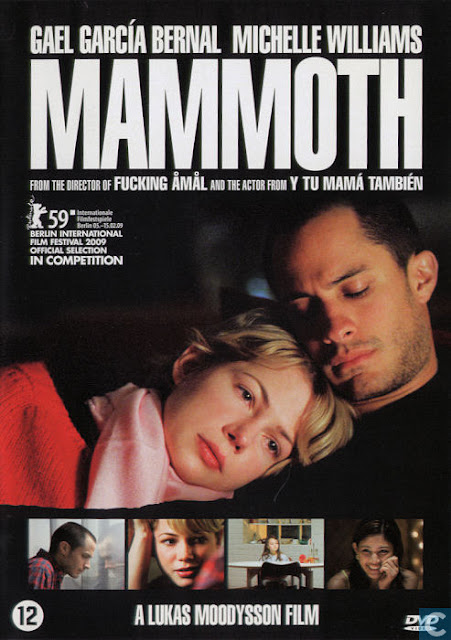Mammoth is a multi-language foreign language film starring Gael
Garcia Bernal and Michelle Williams.
The film follows the story of
an American video game developer (Bernal) who travels to Thailand to meet
investors for a potential life-changing sale. While on his business trip, Mammoth
also follows his wife (Williams) as she and her daughter continue to live stateside
together with their Filipina maid.
In all, Mammoth contains dialogue in Tagalog,
Thai and English.
Mammoth touches on real world themes pertaining to sacrifices
migrant workers make for work, the sex tourism industry in East Asia as well as
the large economic disparity between the rich and poor (both in East Asia and
in the West).
Synopsis
Leo Vidales is living the American dream. He has a job he
loves, is on track to make thousands of dollars and has a beautiful family.
When he gets a call from a foreign investor interested in buying his prized video
game collection, he flies over to Thailand for once in a lifetime a business
trip.
Leo plans his trip with his wife, Ellen promising that he
will call her and their young daughter Jackie every day. While Leo is away,
Ellen and Jackie promise to spend more time together. However, Ellen - an emergency
room surgeon - becomes tied up at work leaving Jackie in the hands of her
nanny, as usual.
The remainder of the film follows the family throughout the
entirety of Leo’s trip abroad.
Despite the family being split a part, each them experience
different aspects of inequality. The father in tourist sector of Thailand, the
mother in-hospital and the daughter through her nanny.
The viewer is treated to
an inter-connected story that sheds light on the reality that many migrant
workers face through many different perspectives.
Important Themes
Mammoth tells a story set on the topic of economic inequality
through a wealthy New York City family. The film cleverly juxtaposes the family
with its prevalent themes, providing the viewer with a unique perspective on
the lives of migrant workers.
As we know, the disparity between the rich and poor is huge
around the world, in North America and even more so in majority world countries.
For example, as reported by Time Magazine, 26 of
the world’s richest people own more money than the wealth of the world’s
poorest 3.8 billion people.
That’s billion, with a B.
The same researchers from Oxfam
previously reported that 62 people owned over half of the world’s money in 2016
(figures have unsurprisingly increased since).
Other inequality watchdogs affirm that the world’s richest 1% own over 45% of the world’s
wealth and that 10 billionaires alone own more than the country of Switzerland.
Showing just how immense of a divide there is between those at the top and the
bottom.
Due to this wealth inequality, many workers from majority
world countries understandably struggle to make ends meet.
You often hear stories about migrant workers being paid pennies to work abroad, people working multiple jobs to support their families back home or people working “survival jobs” in the West despite holding valid certifications for their line of work.
You often hear stories about migrant workers being paid pennies to work abroad, people working multiple jobs to support their families back home or people working “survival jobs” in the West despite holding valid certifications for their line of work.
Many
workers come to the West to seek employment opportunities and it is an all too
familiar tale when you hear about the extent to which these workers push
themselves for the bare minimum.
The same can be said with workers who stay in their home countries.
With regards to Thailand, tourism remains to be a booming industry. It is
estimated that 20% of Thailand’s GDP comes from tourism,
with forecasts suggesting that it will increase to 30% by the year 2030.
Because of such a booming industry, sex tourism has become a
main reason people form the West visit the country. To the point where country’s
beaches has since become synonymous with criminal activity, prostitution and
sex trafficking run by syndicates. Leading many sex workers living lives as modern day slaves and heavily endangering the lives
of local women, teens and children.
Mammoth touches on this aspect of the Thai sex industry,
depicting the troubling widespread issues it has on society how workers find
themselves in worrying circumstances.
Conclusion
Mammoth is a tremendous film. It is one of my favourite Gael Garcia
Bernal films, (as many of you know that he’s my favourite actor). Aside from Bernal's
performance, the film told a very intricate and eye-opening story.
For me, upon first viewing in 2010, I was so taken with Mammoth.
At that time in my life I hadn’t have watched a film that spoke to so many
issues relating to migrant workers and their rights. Back then, it was one of
the first films I had seen that shed light on the global issue. And it did an
impressive job of it.
Since then, Mammoth has always been on the top
of my foreign films list.
It tells a very unique story and I really enjoyed how the
director was able to use his characters to view the many themes depicted in Mammoth from different
perspectives. Allowing the viewer to see how widespread inequality is and how
it affects every single one of us, but especially those living close to the
poverty line.
Don't miss out on Mammoth. Sure, it's been ten years since it was made, but it still holds up as a very impressive film by today's standards.


